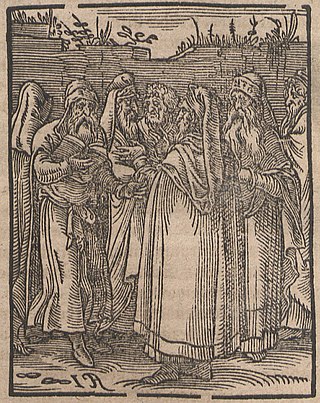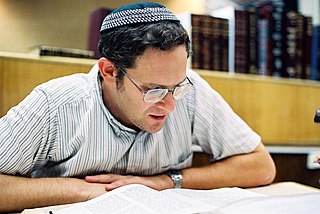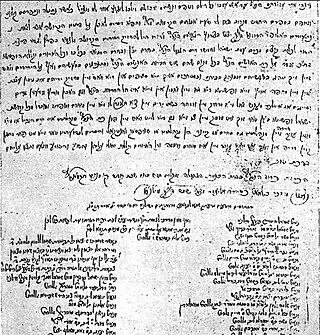
Kabbalah or Qabalah is an esoteric method, discipline and school of thought in Jewish mysticism. It forms the foundation of mystical religious interpretations within Judaism. A traditional Kabbalist is called a Mekubbal.

Mordecai Menahem Kaplan was an American Modern Orthodox rabbi, writer, Jewish educator, professor, theologian, philosopher, activist, and religious leader who founded the Reconstructionist movement of Judaism along with his son-in-law Ira Eisenstein. He has been described as a "towering figure" in the recent history of Judaism for his influential work in adapting it to modern society, contending that Judaism should be a unifying and creative force by stressing the cultural and historical character of the religion as well as theological doctrine.

Orthodox Judaism is a collective term for the traditionalist branches of contemporary Judaism. Theologically, it is chiefly defined by regarding the Torah, both Written and Oral, as literally revealed by God on Mount Sinai and faithfully transmitted ever since.

Reconstructionist Judaism is a Jewish movement based on the concepts developed by Rabbi Mordecai Kaplan (1881–1983) that views Judaism as a progressively evolving civilization rather than just a religion. The movement originated as a semi-organized stream within Conservative Judaism, developed between the late 1920s and the 1940s before seceding in 1955, and established a rabbinical college in 1967. Reconstructionist Judaism is recognized by many scholars as one of the five major streams of Judaism in America alongside Orthodox, Conservative, Reform, and Humanistic.

The formulation of principles of faith that are universally recognized by all branches of Judaism remains undefined. There is no central authority in Judaism in existence today - although the Sanhedrin, the supreme Jewish religious court, would fulfill this role if it were re-established. Instead, Judaism's principles of faith remain debated by the rabbis based on their understanding of the sacred writings, laws, and traditions, which collectively shape its theological and ethical framework. The most accepted version in extent is the opinion of Maimonides.

The Jewish Theological Seminary (JTS) is a Conservative Jewish education organization in New York City, New York. It is one of the academic and spiritual centers of Conservative Judaism and a center for academic scholarship in Jewish studies. The Jewish Theological Seminary Library is one of the most significant collections of Judaica in the world.

Modern Orthodox Judaism is a movement within Orthodox Judaism that attempts to synthesize Jewish values and the observance of Jewish law with the modern world.

Misnagdim was a religious movement among the Jews of Eastern Europe which resisted the rise of Hasidism in the 18th and 19th centuries. The Misnagdim were particularly concentrated in Lithuania, where Vilnius served as the bastion of the movement, but anti-Hasidic activity was undertaken by the establishment in many locales. The most severe clashes between the factions took place in the latter third of the 18th century; the failure to contain Hasidism led the Misnagdim to develop distinct religious philosophies and communal institutions, which were not merely a perpetuation of the old status quo but often innovative. The most notable results of these efforts, pioneered by Chaim of Volozhin and continued by his disciples, were the modern, independent yeshiva and the Musar movement. Since the late 19th century, tensions with the Hasidim largely subsided, and the heirs of Misnagdim adopted the epithet Litvishe or Litvaks.
Jewish religious movements, sometimes called "denominations", include diverse groups within Judaism which have developed among Jews from ancient times. Today in the west, the most prominent divisions are between traditionalist Orthodox movements and modernist movements such as Reform Judaism originating in late 18th century Europe, Conservative originating in 19th century Europe, and other smaller ones, including the Reconstructionist and Renewal movements which emerged later in the 20th century in the United States.
Torah im Derech Eretz is a phrase common in Rabbinic literature referring to various aspects of one's interaction with the wider world. The term also refers to a philosophy of Orthodox Judaism articulated by Rabbi Samson Raphael Hirsch (1808–1888), which formalizes a relationship between traditionally observant Judaism and the modern world. Some refer to the resultant mode of Orthodox Judaism as Neo-Orthodoxy or, in some historiographies, as Frankfurter Orthodoxy.

Gershom Scholem was a German-born Israeli philosopher and historian. Widely regarded as the founder of modern academic study of the Kabbalah, Scholem was appointed the first professor of Jewish mysticism at Hebrew University of Jerusalem.

Rabbinic authority in Judaism relates to the theological and communal authority attributed to rabbis and their pronouncements in matters of Jewish law. The extent of rabbinic authority differs by various Jewish groups and denominations throughout history.
"Wissenschaft des Judentums" refers to a nineteenth-century movement premised on the critical investigation of Jewish literature and culture, including rabbinic literature, to analyze the origins of Jewish traditions.
Tamar Ross is a professor of Jewish philosophy at Bar-Ilan University and a specialist of religious feminist philosophy.
Hasidic philosophy or Hasidism, alternatively transliterated as Hasidut or Chassidus, consists of the teachings of the Hasidic movement, which are the teachings of the Hasidic rebbes, often in the form of commentary on the Torah and Kabbalah. Hasidism deals with a range of spiritual concepts such as God, the soul, and the Torah, dealing with esoteric matters but often making them understandable, applicable and finding practical expressions.
Yeridat ha-dorot, meaning literally "the decline of the generations", or nitkatnu ha-dorot, meaning "the diminution of the generations", is a concept in classical Rabbinic Judaism and contemporary Orthodox Judaism expressing a belief in the intellectual inferiority of subsequent, and contemporary Torah scholarship and spirituality in comparison to that of the past. It is held to apply to the transmission of the "Revealed" aspects of Torah study, embodied in the legal and homiletic Talmud, and other mainstream rabbinic literature scholarship. Its reasoning derives from the weaker claim to authoritative traditional interpretation of scripture, in later stages of a lengthening historical chain of transmission from the original revelation of the Torah at Mount Sinai, and the codification of the Oral Torah in the Talmud. This idea provides the basis to the designated Rabbinic Eras from the Tannaim and Amoraim of the Talmud, to the subsequent Gaonim, Rishonim and Acharonim. Additionally, it has an extra metaphysical explanation in Kabbalah, regarding lower levels of souls in succeeding generations.

Pinchas Polonsky is a rabbi, Russian-Israeli Jewish-religious philosopher, researcher, and educator active among the Russian-speaking Jewish community. He has written original books and a number of translations of works on Judaism.

Moshe Halbertal is an Israeli philosopher, professor, and writer, a noted expert on Maimonides, and co-author of the Israeli Army Code of Ethics. He currently holds positions as the John and Golda Cohen Professor of Jewish Thought and Philosophy at the Hebrew University of Jerusalem and Gruss Professor of Law at NYU School of Law. In 2021 he was elected to the American Philosophical Society.
Menachem Mendel Lefin (1749–1826) was an early leader of the Haskalah movement.

Orthodox Jewish philosophy comprises the philosophical and theological teachings of Orthodox Judaism. Though Orthodox Judaism sees itself as the heir of traditional rabbinic Judaism, the present-day movement is thought to have first formed in the late 18th century, mainly in reaction to the Jewish emancipation and the growth of the Haskalah and Reform movements. Orthodox Jewish philosophy concerns itself with interpreting traditional Jewish sources, reconciling the Jewish faith with the changes in the modern world and the movement's relationships with the State of Israel and other Jewish denominations.











